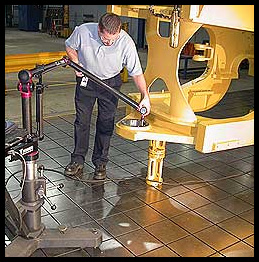GridLOK

GridLOK - a GIANT CMM
This measuring and inspection system enables inspection of large parts without the high cost and complexity of a laser tracker or stationary CMM. The unique design dramatically improves productivity by allowing inspection of details inside, behind and underneath large work pieces. All of those locations are impossible or impractical to measure with any other device. GridLOK provides all these benefits without decreasing the accuracy of the portable CMM arm.
GridLOK uses one or more ROMER portable CMMs in a typical system to become a "Metrology Arena" where all of the CMMs can be measuring to the same part origin. The system can measure large work pieces or multiple small parts while maintaining the portable CMM accuracy anywhere within its standard 4m x 6m measuring area or optionally up to 60m x 60m.
GridLOK enhances measuring accuracies since all measured points are in absolute dimensions relative to the same part origin with no accumulative error regardless of how many times the portable CMM was moved. This replaces the old "leapfrog" method which caused an accumulative deterioration of accuracy every time the CMM was moved. GridLOK volumetric accuracy is equivalent to the laser tracker accuracy used for the certification of the system upon installation plus the ROMER portable CMM accuracy. The grid has a volumetric repeatability of ± .05mm Arm mounting options (i.e. magnetic base or Brunson stand) can contribute no more than ± .05mm volumetric uncertainty. Neither the grid nor mounting options affect arm accuracy.
The system uses small conical seats flush mounted in a concrete floor or steel plate at about 1 metre intervals. The conical seats are then certified by a laser tracker provided by Hi-Tech Metrology. This is a one-time event after which the laser tracker is no longer needed. After that, operator simply touches any of the standard ball probes into three different conical seats and, magically, the portable CMM arm is locked into the common origin. That is the complete training instruction. This phenomenal "lock-in" event takes less than five seconds and works even in the middle of a measuring sequence. Moving the arm and locking-in requires no program interruption, no button pushing, and no keyboard selections ... it's automatic!
| Request More Information |
